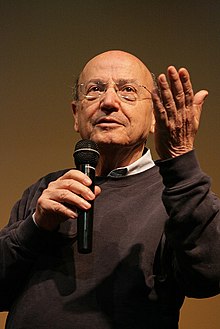Theo Angelopoulos | |
|---|---|
 Angelopoulos in 2009 | |
| Born | Theodoros Angelopoulos 27 April 1935 Athens, Greece |
| Died | 24 January 2012 (aged 76) Piraeus, Greece |
| Alma mater | |
| Occupation(s) | Film director, screenwriter |
| Years active | 1965–2012 |
| Spouse |
Foivi Oikonomopoulou
(m. 1980) |
| Children | 3 |
| Awards | Palme d'Or (1998) |
| Website | Official website |
Theodoros "Theo" Angelopoulos (Greek: Θεόδωρος Αγγελόπουλος; (27 April 1935 – 24 January 2012) was a Greek filmmaker, screenwriter and film producer. He dominated the Greek art film industry from 1975 on,[1] and Angelopoulos was one of the most influential and widely respected filmmakers in the world.[2][3][4] He started making films in 1967. In the 1970s he made a series of political films about modern Greece.
Angelopoulos' films, described by Martin Scorsese as that of "a masterful filmmaker", are characterized by the slightest movement, slightest change in distance, long takes, and complex, carefully composed scenes. His cinematic method is often described as "sweeping" and "hypnotic."[2][5] Angelopoulos has said that in his shots, “time becomes space and space becomes time.” The pauses between action or music are important to creating the total effect.[6]
In 1998 his film Eternity and a Day went on to win the Palme d'Or at the 51st edition of the Cannes Film Festival, and his films have been shown at many of the world's esteemed film festivals.[7]
- ^ Merry 2004, p. 145.
- ^ a b Horton 1999, preface.
- ^ Malcolm 2000.
- ^ Thomson 2002, pp. 21–22.
- ^ Horton 1999, back cover.
- ^ Fainaru 2001, p.87.
- ^ Cite error: The named reference
IMDb-TA-awas invoked but never defined (see the help page).